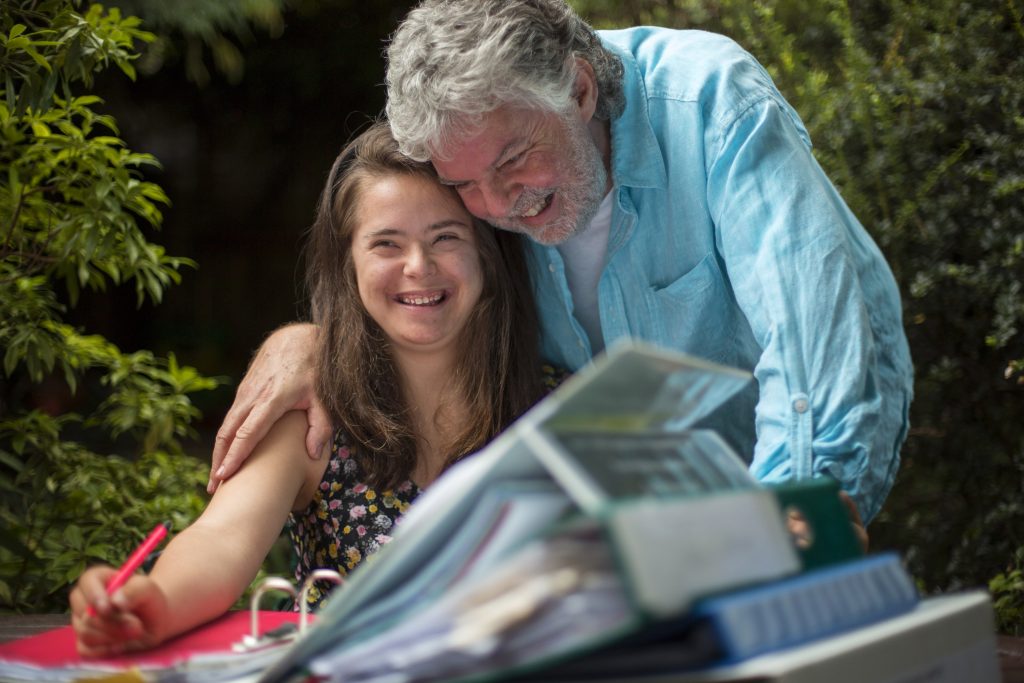
While imbibing a cup of coffee at the computer, my Twitter feed led me to an article in the Daily Mail with the strapline, ‘Babies with Down’s syndrome who are given green-tea supplements are less likely to develop facial disorders.’
Well, you could have knocked me over with a tea leaf. This was something. We always knew there was more that we could and should have done for our daughter 26 years ago when she was born with Down’s syndrome.
We had clearly missed a trick. The answer to stigmatisation, exclusion and discrimination lay in a tea bag. If only we had supplemented her diet with green tea, it all could have been so very different. Apparently, new research in Spain suggested: ‘Six out of seven Down’s syndrome sufferers … developed facial dimensions would have matched her healthy peers.’
Where to begin?
Sarah does not suffer from Down’s syndrome. She has the genetic condition, which affects her life in many ways, but if anyone has met Sarah and other children and adults with Down’s syndrome, ‘suffering’ would not be the word that comes to mind. Sarah’s oft repeated phrase, ‘I love my life’ would easily dispel that myth.
I’m also intrigued by the comparison with ‘healthy peers’. Does that make her unhealthy because of a genetic condition? Sarah does not have a disease. The article continued, ‘Researchers hope that normalising the facial features of Down’s syndrome may help to reduce the stigma patients experience.’
‘Patients’? ‘Stigma’? People with Down’s syndrome are not ill and the only stigma that they might experience is the publication of such articles, which perpetuates the stereotypical view of my daughter and others. Increasing the awareness and understanding of Down’s syndrome and the opportunities for people with the condition will do much more to reduce any stigma.
Sarah has facial features and physical characteristics that are more common in people with Down’s syndrome, but she looks more like us, her parents, than others with the condition. Her physiognomy remains unmistakably that of a young woman with Down’s syndrome and that’s who she is. Her Down’s syndrome is a part of her very being so we do not wish to take that away from her. We would only be changing the way she looks to make her features more acceptable to other people. In any case, her unique character is so prominent that her features become irrelevant.
Of course, supplementing diets is not a new idea; over 20 years ago parents were experimenting with TNI (Targeted Nutritional Intervention) whereby supplements of vitamins, minerals, amino acids and digestive enzymes were given to children with Down’s syndrome. The programme was supposed to help cognitive development, clarity of speech and it was even claimed that there was an improvement of facial features. Even then, the term ‘improvement’ made me me somewhat nervous, as the term can only be subjective and dictated by society’s desire to make everyone appear ‘normal’.
Are we now still are trying to eradicate the physical characteristics as a way of denying the diagnosis? Everybody has his or her own individual personality and physical make-up. People with Down’s syndrome are all unique individuals with their own personalities, family backgrounds and aspirations that make them who they are. Every individual person should be valued for who they are, not what they look like.
Anyway, I had pondered too long over this preposterous article and so by now my coffee had gone cold. Maybe for my next beverage, I should forget the caffeine and imbibe some green tea. I had, after all, always wanted to look like George Clooney. Apparently, a nightly cup of Earl Grey can create a noble look, a steaming demitasse of Darjeeling before bed might turn me into a Kit Harrington doppelgänger and who knows the effect of a pint of Lapsang Souchong a day might achieve?
No…on second thoughts I think I’ll stick to the java and remain just who I am.
Andy Merriman is the Author of ‘A Major Adjustment, How a Remarkable Child Became a Remarkable Adult’, published by Safe Haven Books and available from the Down’s Syndrome Association and all bookshops.
